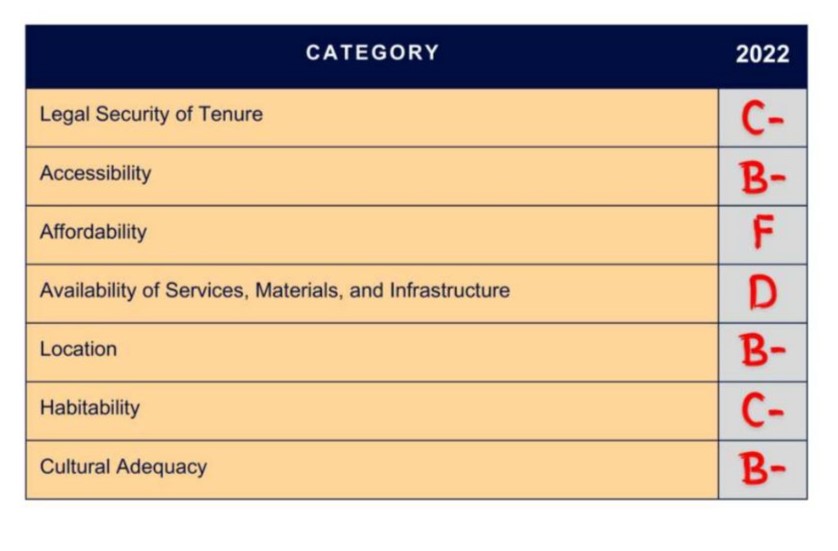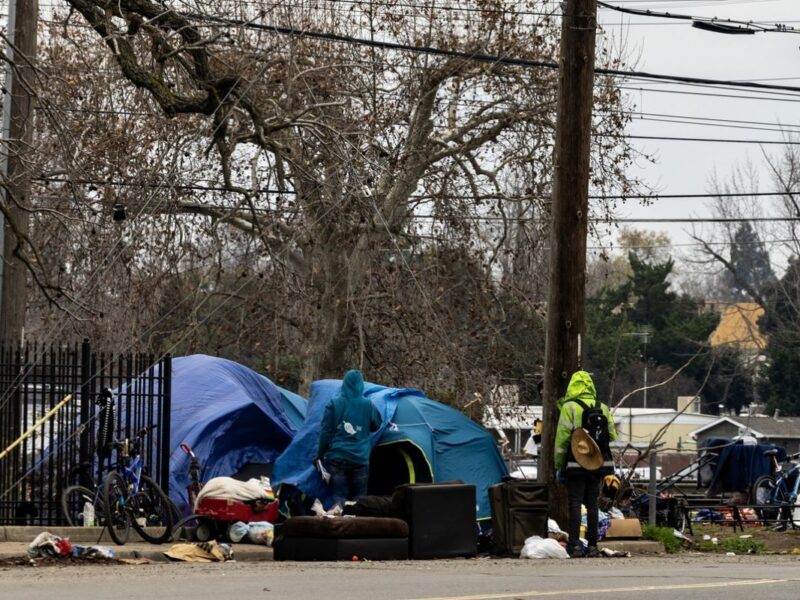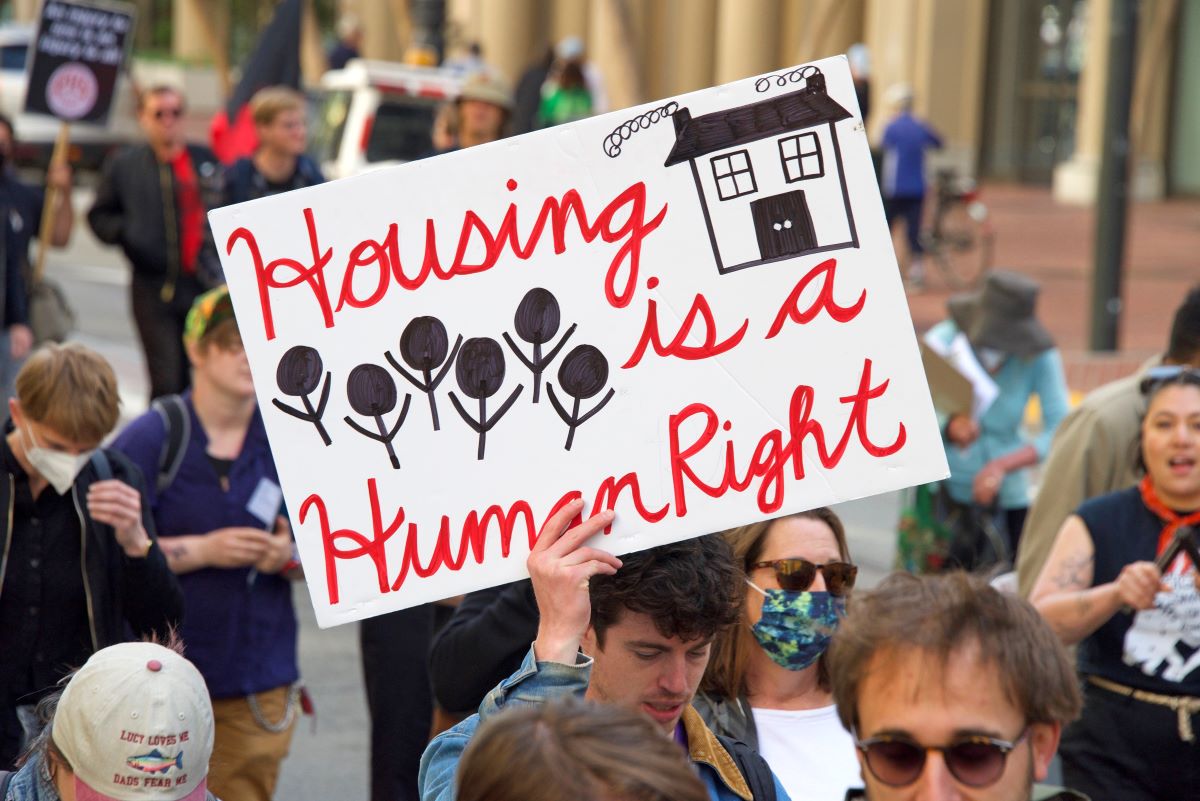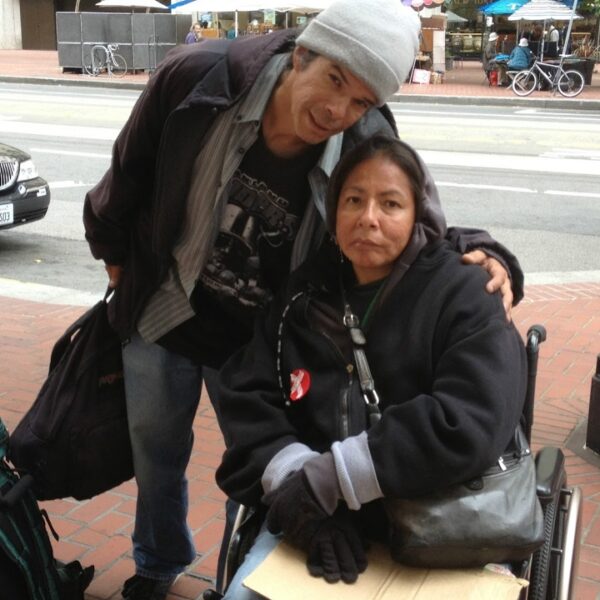New Report Grades the United States’ Response to Housing and Homelessness
The U.S. is failing to meet several internationally accepted standards for providing adequate and affordable housing, according to a new report from the National Homelessness Law Center and the University of Miami Law School Human Rights Clinic.
Both groups graded the U.S. in seven elements of the international human right to housing developed under the International Covenant of Social, Economic, and Cultural Rights, a treaty the U.S. signed in 1976 but never fully ratified. The seven standards include:
- security of tenure
- accessibility
- affordability
- availability of services
- habitability
- location
- cultural adequacy
Each standard was assigned a letter grade, with A representing the highest grade and F representing the lowest. Overall, the 2023 U.S. report card had mixed results.
The country received passing grades for location (B-), accessibility (B-), and cultural adequacy (B-). However, it also received low marks for legal security of tenure (C-), availability of services (D), and habitability (C-). However, the U.S. also received a failing grade for affordability (F).

The report card also makes several policy recommendations to address these issues in the future. For example, the report card says U.S. policymakers should permanently implement COVID-19 policies like emergency rental assistance to address the country’s unaffordable housing market.
The U.S. could also increase funding for Section 9 housing and repeal the Faircloth Amendment to address its habitability issues, according to the report card. The Faircloth Amendment limits the number of public housing units that any public housing authority can own and operate.
“Housing is a human right, recognized around the globe,” said Eric Tars, National Homelessness Law Center Senior Policy Director. “But here in America, tenants know that the rent is too damn high, and the growing encampments we see on our streets are a result of that.”
A Time for Action: We Must Make Housing a Human Right in Practice
The report card was released as homelessness increases in cities across the U.S.
Data from Pew Trusts shows that homelessness has increased most in cities like New York City, Houston, Texas, and Phoenix, Arizona, where rents have surged since the pandemic began.
The Biden-Harris administration has also taken a tough public stance against unaffordable housing. For instance, the Department of Housing and Urban Development has allocated hundreds of millions of dollars toward fighting housing discrimination and building affordable homes for people exiting homelessness and low-income earning seniors.
But Tars said these efforts are being made in vain because the U.S. doesn’t consider housing to be a human right in practice. Instead, it is a rhetorical argument, Tars continued.
One example is how the U.S. presents itself before the United Nations Human Rights Committee. In 2021, the U.S. government argued in its Fifth Periodic Report that access to housing is not “inextricably related to or otherwise essential to the enjoyment of the right to life.” The body also argued that addressing homelessness and poverty is outside the scope of the federal government.
Tars said the State Department also has a long-standing practice of resisting language in treaties that acknowledges housing is a human right. They do so because the government considers itself the protector of civil and political rights, not economic and social rights, Tars added.
“The term ‘housing is a human right’ is more than just a slogan. It’s a set of legal obligations that aren’t binding in the U.S. unless we make them so and hold our government accountable,” Tars said.
The sort of bifurcated identity that America displays toward housing is also one reason why the same issues keep appearing in NLHC’s report cards, Tars continued. For example, the Law Center gave the U.S. an “F” for affordability in 2016. The 2016 report card also gave the country a “D” grade for its availability of services, which was unchanged in the 2023 report.
To advocates like Tamar Ezer, the acting director of the University of Miami Law School’s Human Rights Clinic, the 2023 report card shows that gaps still need to be filled before the U.S. can begin meeting the international standards for affordable and attainable housing.
“The right to housing is a basic human right recognized around the world and essential for a life with dignity,” Ezer said. “This report assesses current gaps in realizing this right in the U.S. and sets out a roadmap for progress. The hope is to thus support vibrant national, state, and local movements for the right to housing, holding the U.S. accountable for each of seven dimensions of this right.”
How You Can Help
Now is not the time to be silent about homelessness in the U.S. or anywhere else. Unhoused people deserve safe and sanitary housing just as much as those who can afford rent or mortgage.
Poverty and homelessness are both policy choices, not personal failures. That’s why we need you to contact your officials and tell them you support legislation that:
- Streamlines the development of affordable housing
- Reduces barriers for people experiencing homelessness to enter permanent housing
- Bolsters government response to homelessness
Together, we can solve homelessness.













